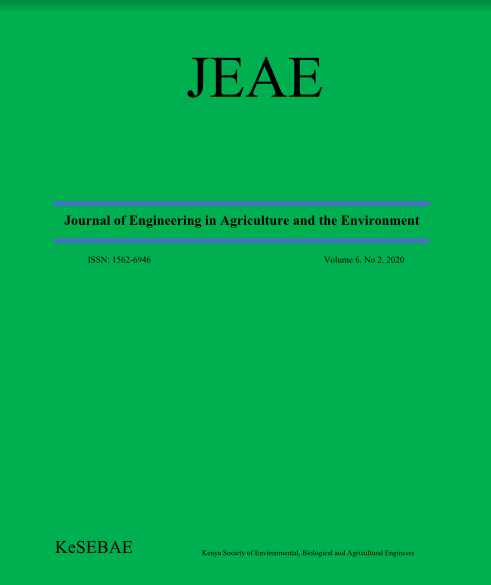Abstract
Urban and peri urban agriculture (UPA) forms a key component of the Food and Agriculture Organization of the United Nations (FAO) special program for food security. UPA is widely upheld as a possible solution to the increased food insecurity which is linked to urban population expansion. In developing economies such as Kenya, increased urban population is highly pronounced unlike in other developed economies. This is attributed to high birth rates, and the increasing rural-urban migration, leading to expansion of urban slums with high levels of urban poverty, unemployment, food insecurity and malnutrition. With UPA seen as an opportunity for improving food supply, local economy, health conditions and environmental sustainability, it's imperative to adopt such measures. However, limited sources of water in the urban cities are seen to limit pervasiveness of UPA despite its well-known benefits. In this study, investigation of the potential for an eco-friendlily UPA (EcoUPA) was carried out in Nairobi Kenya. Using stratified random sampling to identify respondents, carrying out field surveys and administering questionnaires to establish the existing water sources, wastewater treatment systems and the utilization of these systems for reuse of the wastewater. Further, the satisfaction levels of the respondents with their wastewater treatment systems, their openness to change, and the methods preferable to them were also determined. From the study, it was determined out of 300 respondents interviewed only 66 (22%) re-used wastewater and only 54 of them reused it for crops production. Ninety - eight (33%) of respondent were interested in getting information on wastewater treatment systems that allow reuse of water and 124 (41%) respondents were willing to pay for the new system.
References
R. A. Ayambire, O. Amponsah, C. Peprah, and S. A. Takyi, (2019). “A review of practices for sustaining urban and peri-urban agriculture: Implications for land use planning in rapidly urbanising Ghanaian cities,” Land use policy, vol. 84, no. February, pp. 260–277.
P. B. Cobbinah, M. O. Erdiaw-Kwasie, and P. Amoateng, (2015). “Rethinking sustainable development within the framework of poverty and urbanisation in developing countries,” Environ. Dev., vol. 13, pp. 18–32.
P. H. I. N. Africa, (2014). Growing Greener Cities.
K. W. Mwangi, (2015). “Factors Influencing Urban Agricultural Practices in Kenya: A Case of Nairobi Country, Kenya,” p. 104.
P. Drechsel and S. Dongus, (2010). “Dynamics and sustainability of urban agriculture: Examples from sub-Saharan Africa,” Sustain. Sci., vol. 5, no. 1, pp. 69–78.
B. K. Kurgat et al., (2018). “Drivers of sustainable intensification in Kenyan rural and peri-urban vegetable production,” Int. J. Agric. Sustain., vol. 16, no. 4–5, pp. 385–398.
F. Orsini, R. Kahane, R. Nono-Womdim, and G. Gianquinto, (2013). “Urban agriculture in the developing world: A review,” Agron. Sustain. Dev., vol. 33, no. 4, pp. 695–720.
O. O. Cofie, R. Van Veenhuizen, and P. Drechsel, (2003). “Contribution of Urban and Peri-Urban Agriculture to Food Security in Sub-Saharan Africa,” Water Manag., pp. 1–12.
S. Buechler, G. D. Mekala, and B. Keraita, (2006). “Wastewater use for urban and peri-urban agriculture,” Cities farming Futur. Urban Agric. green Product. cities, vol. 2006, no. August, pp. 243–273.
S. Graefe, A. Buerkert, and E. Schlecht, (2019). “Trends and gaps in scholarly literature on urban and peri-urban agriculture,” Nutr. Cycl. Agroecosystems, vol. 115, no. 2, pp. 143–158.
L. Miller-Robbie, A. Ramaswami, and P. Amerasinghe, (2017). “Wastewater treatment and reuse in urban agriculture: Exploring the food, energy, water, and health nexus in Hyderabad, India,” Environ. Res. Lett., vol. 12, no. 7.
C. A. Scott, N. I. Faruqui, and L. Raschid-Sally, (2004). “Wastewater Use in Irrigated Agriculture: Management Challenges in Developing Countries Rapid Expansion of Wastewater Irrigation in the Coming Decades,” C. A SCOTT, FARUQUI, N. I., NASER, I. RASCHID-SALLY, L. Wastewater use Irrig. Agric. confronting livelihood Environ. realities. UK CABI., pp. 1–10.
M. Qadir et al., (2010). “The challenges of wastewater irrigation in developing countries,” Agric. Water Manag., vol. 97, no. 4, pp. 561–568

This work is licensed under a Creative Commons Attribution 4.0 International License.
